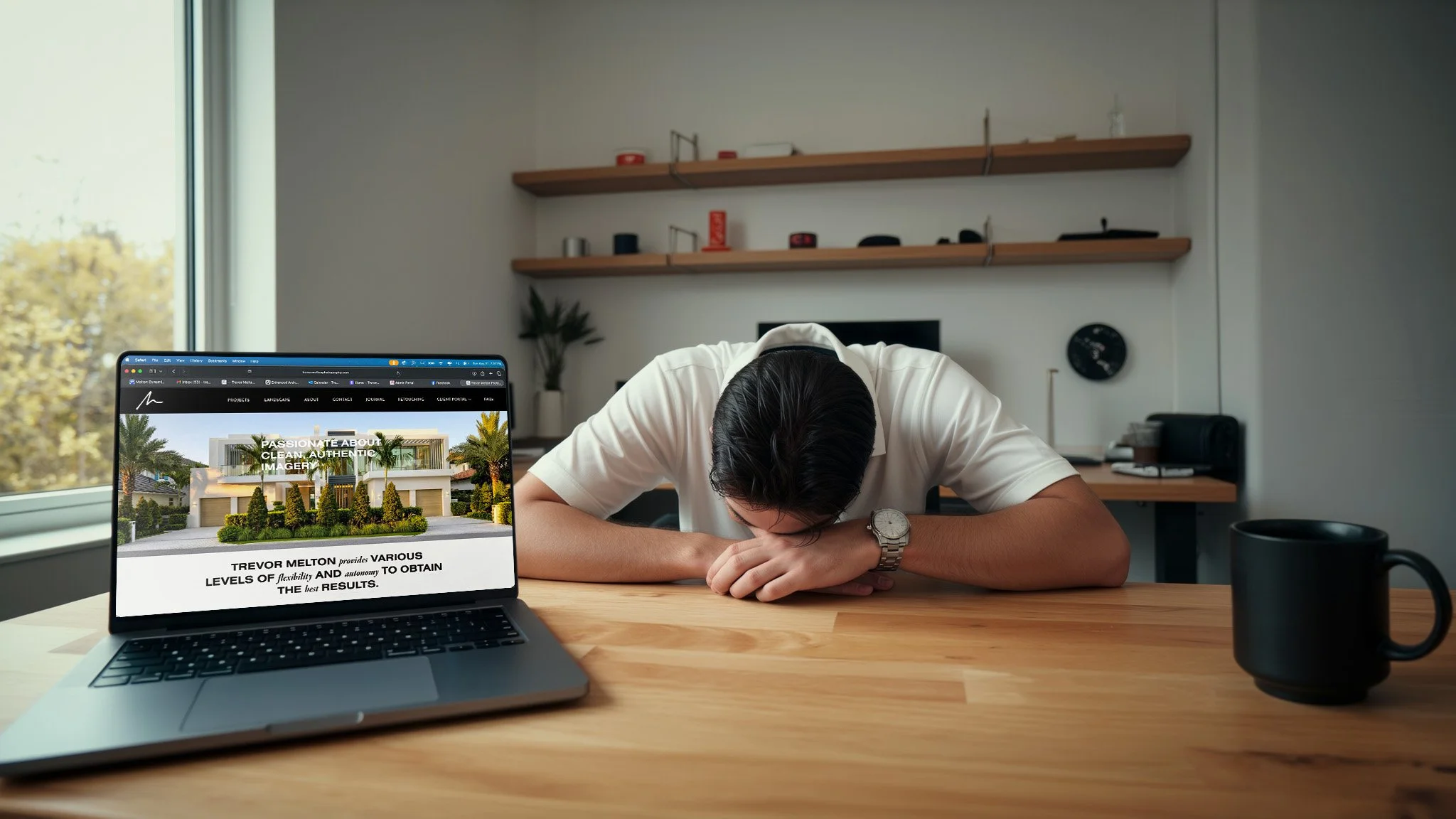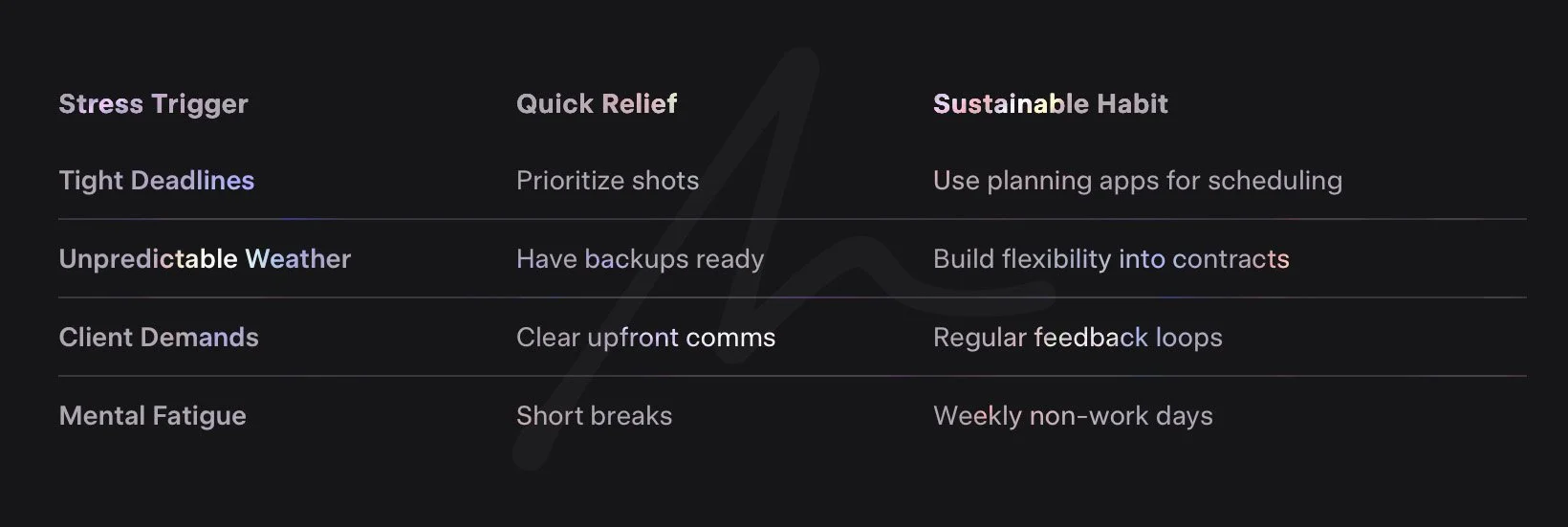Managing Stress in Run-and-Gun Real Estate Photography
In the fast-paced world of luxury real estate photography, where deadlines loom and conditions change on a dime, run-and-gun shoots can feel like a thrill ride—one that's exciting but often leaves you drained. I've balanced my schedule to a 50/50 mix of these quick-turnaround sessions and more deliberate, bespoke projects for top agents and builders, but the stress from run-and-gun work still requires active management to stay sharp.
In 2025's demanding market, where burnout impacts a lot of creatives, prioritizing wellness is crucial for delivering consistent, high-quality results. Here's how to handle the frenzy, from pre-shoot planning to post-recovery, based on tactics that have kept me productive and sane in this unpredictable market.
//TM©
//TM©
Prep Like It's Your Best Friend: Keep Things Simple and Client-Focused
When you're new, the key to cutting stress is keeping prep straightforward and collaborative—don't overcomplicate it with stuff that might not fit your style. Focus on communication to ensure everything's set before you arrive, so you can hit the ground running without nasty surprises.
Confirm Readiness with Clients: Send a simple reshoot checklist to your clients ahead of time, outlining what needs to be ready (like decluttered rooms or open blinds). Follow up with a quick call or message to double-check— this helps align expectations and avoids walking into a mess.
Pack Smart for your Environment: Always toss in anti-fog wipes and extra batteries to sidestep technical issues. Think of it as your safety net for those run-and-gun moments when you can't afford downtime.
Pro Tip for Beginners: Keep it light— no need for detailed gear or shot lists if that doesn't suit you. A mental run-through of essentials (camera, lenses, backups) is often enough. This approach saved me tons of headaches early on, letting me arrive confident and ready to shoot.
Own the Shoot: Stay Grounded When Things Get Hectic
Once you're on site, things can speed up fast—client changes, light shifts, or even a sudden downpour. As a newbie, it's easy to feel overwhelmed, but small habits can help you stay calm and capture those killer shots.
Breathe and Adapt: If stress creeps in, pause for a quick breath—inhale for 4, hold for 4, exhale for 4. It resets your mind so you can pivot without losing focus.
Gear That Fits Your Flow: Keep it simple. Curate a reliable kit like a versatile wide-angle lens (16-35mm is what I recommend) and a lightweight tripod. Less stuff to manage means more energy for composing those shots.
Pro Tip: Tackle your key shots first, like exteriors before the light changes. I learned this the hard way in my early REP days—it turns potential panic into progress.
Recharge After the Rush: Don't Skip the Cool-Down
The post-shoot adrenaline drop is real, and skipping recovery can lead to quick burnout when you're starting out. Make it a habit to wind down right away to keep your passion alive.
Quick Debrief: Take 5-10 minutes to note what went well and what you'd tweak next time—then step away from your camera and screen.
Automate the Boring Bits: Use easy AI tools for basic edits or culling to lighten the load, giving you more time to relax.
Pro Tip for Beginners: Block at least an hour after each shoot for "you time"—a walk, snack, or non-work chat. This kept me from crashing in my first year and helped me build stamina for bigger gigs.
Build Habits for the Long Haul: Stay Resilient as You Grow
As you get more shoots under your belt, stress can build up— but simple routines will help you handle it like a pro over time.
Set Your Limits: Don't overbook; aim for 2-3 shoots a week at first to avoid overwhelming yourself. Clerar contracts help manage client expectations too.
Connect with Others: Join online groups or local meetups for real estate photographers—sharing stories reminds you you're not alone.
Stress Management Guide
Pro Tip for Beginners: Start small—pick one habit, like the breathing technique, and practice it on every shoot. It builds up, and soon you'll feel more in control.
Wrapping up, managing stress in run-and-gun real estate photography is about starting simple and building from there—prep smart, stay calm, recharge, and create habits that fit your life. When I was new, these steps turned overwhelming days into manageable ones, helping me grow eventually into more architectural work. You've got this—focus on one thing at a time, and the rest follows. What's stressing you out most as a beginner? Drop it in the comments; I'd love to offer more tips. Check out my portfolio or subscribe to my newsletter for more beginner-friendly tips on mastering this industry.


